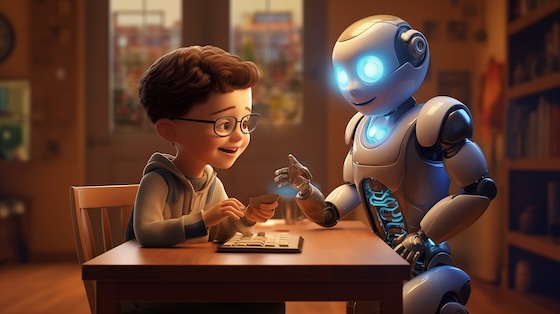
We’re seeing headlines announcing that kids trust robots more than they do human beings. We checked out the report.
The experiment
111 children from 3 to 6 years of age were shown videos in which humans and robots named familiar objects. In each case, mistakes were sometimes made. The possibilities were these:
- The robot mislabeled the objects and the human was accurate. (Reliable human)
- The human mislabeled the objects and the robot was accurate. (Reliable robot)
- Both human and robot were accurate. (Reliable both)
Following the first set of videos, the kids were shown the human and the robot naming unfamiliar objects.
So the kids saw a robot pointing at a doll and saying “This is a tree” or a human calling a ball a cookie. Having established which of the pair was reliable, the researchers then showed a strange plastic object and had the human call it a “modi” while the robot called it a “toma” or vice versa.
They then asked the children what the object was. The kids picked one of the names they had been given, thus demonstrating which speaker they trusted more.
The results
Children chose the reliable speaker when there was an unreliable speaker. If the robot said that the doll was a ball and then said that the strange object was a toma, the kids banked on the humans and said it was a modi.
Equally, if the human had given the wrong name to a familiar object, the kids would trust the robot for the name of the unfamiliar object.
This result was in line with expectations.
The surprise came when both the robot and the human had been correct in their labeling of the familiar objects. Both these speakers had steered the kids right on the names of the familiar objects. So when they gave names to the unfamiliar objects, the kids had no good way to determine who was more likely to be correct.
The researchers expected the kids to show a bias toward the human. In fact, they were more likely to choose the robot.
Trust?
The researchers made efforts to control variable such as whether the human or the robot spoke first, the accent and gender of the speakers, and other possible confusing factors. However, only 37 children saw the reliable-both scenarios, and 15 of them were three year olds. There were 7 or 8 each of the other age groups. Can we conclude from this that “children trust robots more than humans”?
It seems like a bit of a leap.
However, previous research has suggested that people may trust robots more to manage finances, trust algorithms more than social media, and to favor robots in trust games.
Questions asked of the children by the researchers in the study suggested that the kids thought people might have labeled the items wrong on purpose (which was of course true) while they didn’t think the robots had intentionally deceived them. However, the robots were favored only when both the robot and the human had named the familiar objects correctly, so this doesn’t seem to be connected directly with the preference for robots in the reliable-both case.
Maybe the kids thought the unfamiliar objects were not normal things that humans would know about. Obots, perhaps, are more likely to know the names of weird things you’ve never seen before.
Implications
The researchers thought that robots might be useful in the classroom, since kids are inclined to trust them. But we wonder whether — to the extent that this experiment actually shows a preference for robots — it might be a bit of a warning. If we’re ready to believe that humans will try to trick us and that machines aren’t capable of doing so (or at least not inclined to do so) then aren’t we more vulnerable to AI trickery? Will we be inclined to overlook errors in predictive maintenance results on the grounds that machines don’t make mistakes? Will we allow machine’s calculations to overrule our common sense?
It’s worth thinking about.
